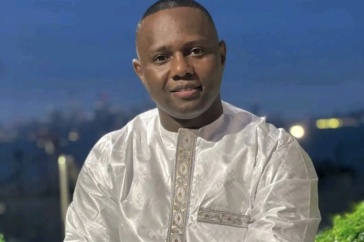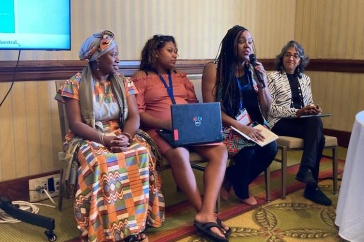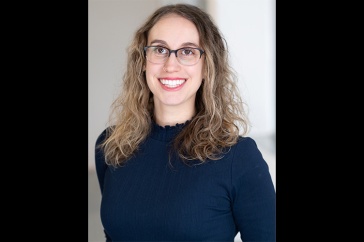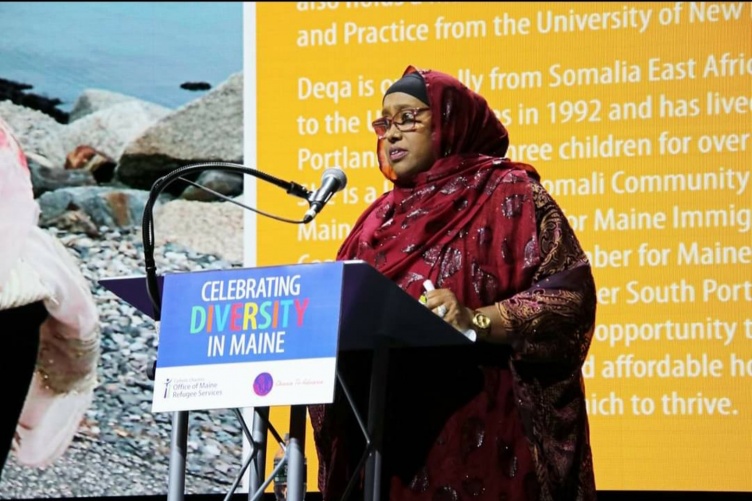
Deqa Dhalac '13G, a graduate of the Carsey School, was recently elected the first Somali-American mayor in the United States.
Why not me?
That’s the question Deqa Dhalac ‘13G posed to herself when she first began mulling over the decision to run for political office in 2018. Dhalac, a Somali American who has lived in the U.S. since the 1990s and in Maine since 2005, became increasingly active in condemning anti-immigrant and pro-nativist messaging and political leaders starting in 2015. Living in South Portland at the time, she worked within the local Somali American community to organize rallies condemning negative views of immigrants and Muslims and completed training with Emerge Maine, a statewide organization that recruits and trains Democratic women leaders.
“Women, in general, do not put their names in for political positions,” stated Dhalac, a graduate of the Master in Community Development (MCD) program at the University of New Hampshire’s Carsey School of Public Policy. “So, for me as a black woman, as an immigrant woman, as a Muslim woman, [making the decision to run] was far more for me to grab.”
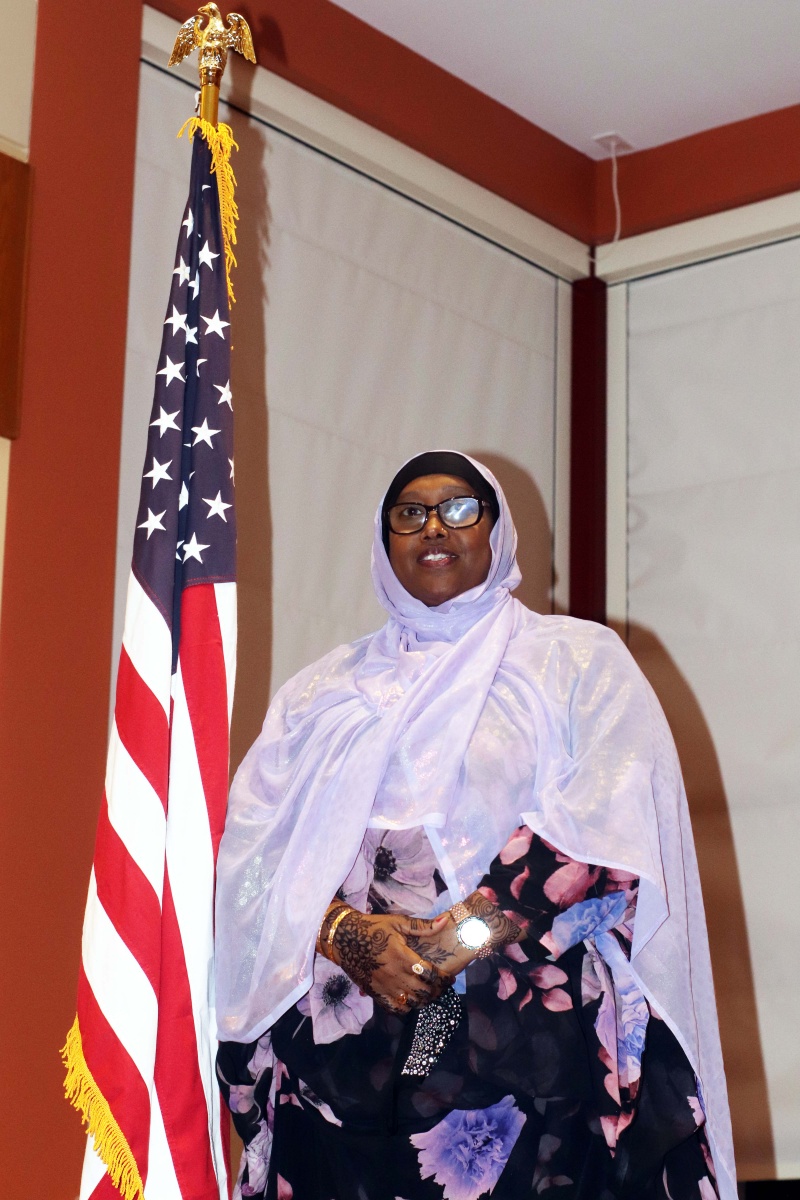
Her opportunity came in 2018 after the city councilor for her district, South Portland’s District 5, stepped down from his post after serving one year.
“A lot of people told me ‘Hey, this is your time. Now is the time for you to run,’” Dhalac described. She began knocking on doors, meeting her potential constituents face-to-face, in a city whose population is about 90 percent White and in a state that has the whitest population in the country.
And she won.
Fast forward several years to South Portland’s 2021 mayoral caucus. In August of last year, she began speaking with her fellow council members, telling them of her plans to run for mayor. She was unanimously elected to the post by her colleagues and inaugurated on Dec. 6, 2021.
Dhalac will serve as mayor of South Portland and chair the city council for one year, helping to guide the city’s strategic goals. These goals include increasing diversity, equity, and inclusion initiatives within the city; helping women pursue and achieve leadership roles; increasing availability of and access to affordable housing; and improving citywide green efforts to mitigate climate change.
Why Not Her?
Growing up in an authoritarian-ruled Somalia in the 1980s, Dhalac credits her father as part of her inspiration to further her education and pursue public service.
My father spoke many different languages, and he introduced us to many countries in the world and their political views. He talked to us about places where people could vote for people they wanted to. That was something that I’d never experienced in Somalia.
“My father spoke many different languages, and he introduced us to many countries in the world and their political views,” said Dhalac in a recent phone interview. “He talked to us about places where people could vote for people they wanted to. That was something that I’d never experienced in Somalia.”
During this time, she became fascinated with different political ideologies and democratic systems and especially interested in places where citizens could actually elect the candidates they wanted.
Dhalac’s father died in 1989, one year before she fled the country due to the growing tensions of the Somali Civil War. In 1992, Dhalac immigrated to the United States, first living in Atlanta before moving to Lewiston, Maine, where one of her first roles was as an interpreter for Catholic Charities Maine. Dhalac went on to found her own interpreting service, helping some of the tens of thousands of Somali refugees who now call Maine home to find housing and jobs, apply for citizenship, register to vote, and learn English.
Today, she serves as the Maine Department of Education’s Family Engagement and Cultural Responsiveness Specialist, a role in which she works with students, and their families, in school districts across the state to become more active and engaged in their schools.
The Role of Education
Since moving to the U.S., Dhalac has built her network and found a community through both her volunteer work and her educational pursuits. She’s served as the president of the board of directors of the Maine Immigrant Rights Coalition, director of the Somali Community Center of Maine, founder and executive director of Immigrant Women’s Health, and a board member of the Maine Women’s Fund. She graduated from the Carsey School’s MCD program in 2013 (in the second-ever cohort of the program during its history at UNH) and completed a Master of Social Work at the University of New England in 2017.
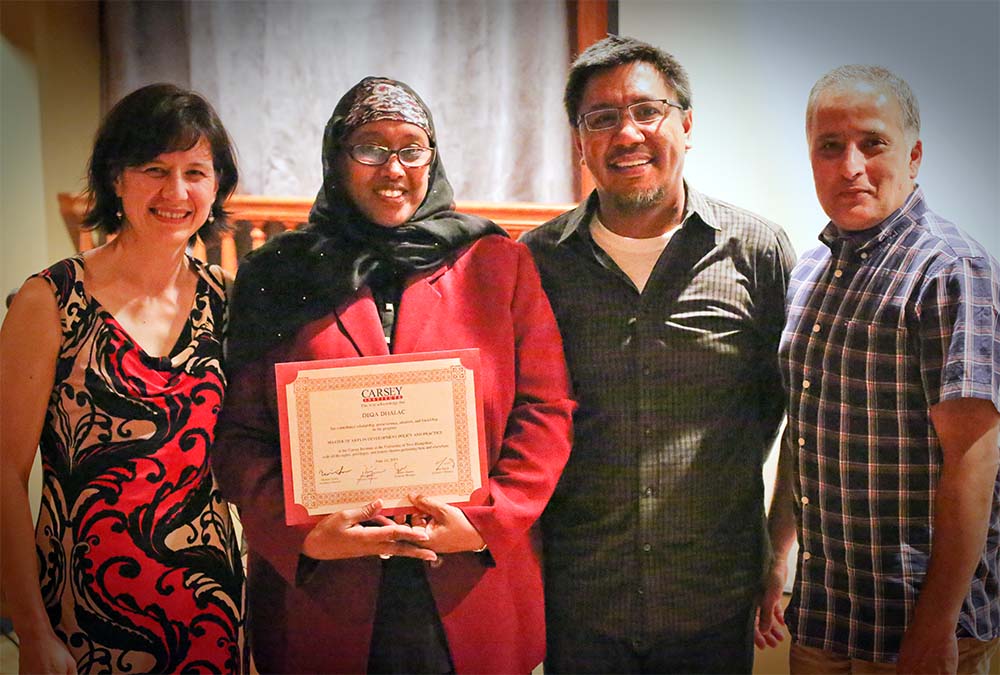
During her time at Carsey, I saw how Deqa's dedication, intelligence, persistence, and commitment would make her a leader in her community, and she’s done exactly that and then some.
“It’s exciting to see Deqa receive this honor and accomplish so much within her community, but not surprising,” stated Michael Swack, director and founder of the MCD program at the Carsey School. “During her time at Carsey, I saw how her dedication, intelligence, persistence, and commitment would make her a leader in her community, and she’s done exactly that and then some.”
For Dhalac, it was the flexibility of the MCD program that encouraged her to enroll in the Carsey School. She cites the degree’s emphasis on international nonprofit work and on policy development and implementation as major factors for why she chose the degree.
“Just as importantly, the program taught me to build relationships with people, helped me to build connections with state legislators, CEOs, community organizers, and similar professionals,” Dhalac added. “So having done all of that – that community building – really aided me in reaching out to so many people when I eventually said, ‘Yes, I want to run for office.’”
It was that network, that community, that first stepped up, helping Dhalac to create a campaign website, build and send out email blasts, organize fundraising, and take on a myriad of other tasks during her initial run for city council. In the end, she said that support allowed her to “show up and begin knocking on doors” and meet with her future constituents, one-on-one.
And those relationships have carried forward, bolstering her efforts even today.
“It works two ways – it’s a two-way street,” Dhalac said of the relationships and friendships she’s built over the years through her outreach, education, and public service work. “It’s lifelong and based on kindness, hard work, empathy, connection, truth, and a whole lot of encouragement.”

















































